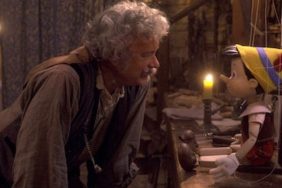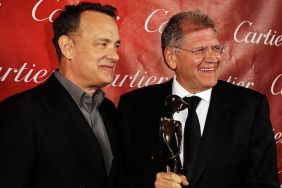Cast:
Ray Winstone as Beowulf
Anthony Hopkins as Hrothgar
John Malkovich as Unferth
Robin Wright Penn as Wealthow
Brendan Gleeson as Wiglaf
Crispin Glover as Grendel
Alison Lohman as Ursula
Angelina Jolie as Grendel’s Mother
Review:
Everyone who’s made to high school English probably has some knowledge of the Old English epic about a great Germanic warrior who comes to save the Danes from a marauding monster.
As a piece of ancient, epic storytelling, “Beowulf” isn’t naturally in step with modern narrative styles, and the main undertaking of director Robert Zemeckis and his screenwriters Neil Gaiman (“MirrorMask”) and Roger Avary (“The Rules of Attraction”) in the most recent adaptation is to introduce some much needed characterization into what could be, on film, a dry recitation of events. The result is frustratingly uneven that never quite lives up to its promise.
This version of Beowulf the man (Ray Winstone) is a fully modern interpretation, as flawed as he is capable, filled with hubris and ambition that wars with his more heroic nature. Gaiman and Avary have recast him as an unreliable narrator, giving them license to expand on the relationship between Beowulf, Grendel (Crispin Glover), and Grendel’s Mother (Angelina Jolie) and nature of the curse that brings them together, creating stronger bonds of character and theme than just hero and monster. Rather than just recreating heroic deeds of monster slaying, though there is certainly plenty of that, Zemeckis’ “Beowulf” is concerned with the nature of heroism is it just doing great deeds, or is it more connected to the reasons why those deeds must be done.
Beowulf is a boastful man, as concerned with his reputation and legacy as anything else, and the only thing that keeps him from being a truly boorish braggart is the fact that he can actually back up everything he says. It certainly makes him a more complex and interesting character, in many ways a sort of proto-Arthurian character, but doesn’t make him particularly likeable or easy to relate to, and not enough is done to really ameliorate that, which is the beginning of the frustrating part.
The filmmakers are willing to go a certain distance from the original material, but only halfway, and the result is characters that aren’t as fully fleshed out as they could be. Many of the characters — in particular John Malkovitch’s Unferth and Robin Wright Penn’s Wealthow — seem to exist only because they’re from the original work, and add nothing of substance to the new proceedings. Until suddenly, they’re being explored and expanded on as people, but all too briefly. Beowulf himself is the only one who gets any real depth, and everything else is window dressing, but window dressing that detracts more than it adds.
Like the original poem, in its final third the film takes a long leap forward, to Beowulf as an aged king, introducing new characters and some vastly changed relationships, but without enough explanation for them to create the kind of connection to really pay off. The film really could have used some more exploration of those relationships and the changes in Beowulf as an aged man looking back at the changes in his life, instead of the extended action sequences it offers. The final fight against the dragon (now a son of Grendel’s Mother as well, instead of the original, more arbitrary monster).
Technically, “Beowulf” is a marvel, particularly in 3D, where the full scale of the production can be appreciated. Zemeckis has once again chosen to make the film in performance capture animation, but it has its drawbacks. In close-up the animation is flawless, and the fight with Grendel (whose design really does do the word monster credit) and the Dragon are extremely well designed. But the farther the camera gets away from its characters, the more they tend to resemble generic computer characters, and it doesn’t help that Zemeckis is largely aiming for realism in his animation and effect, begging the question why bother animating at all. Which isn’t to suggest “Beowulf” would be a better film in live action, it would probably be pretty much the same, but somehow, the tone of the film never quite matches the style in which it was made.
The performances are somewhat uneven as well. Winstone and Anthony Hopkins as the aging king Hrothgar are solid throughout (but not any more than that), but Jolie is in full Alexanderesque overacting mode, and Malkovitch often seems as if he’s reading off a cue card, even when he’s supposed to be deeply emotional and sincere. Only Brendan Gleeson as Beowulf’s loyal retainer Wiglaf seems to be giving it his all, and his terrific screen presence shines through even on his animated face.
“Beowulf” is a well conceived and technically excellent rendition of the ancient legend, but it doesn’t follow its ideas through all the way, and some strange choices on the part of Zemeckis ultimately make it a little less than the sum of its parts. It’s not particularly bad, but it is a little underwhelming.










